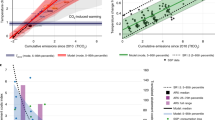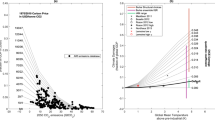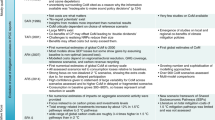Abstract
Perhaps the most ‘dangerous’ aspect of future climate change is the possibility that human activities will push parts of the climate system past tipping points, leading to irreversible impacts1. The likelihood of such large-scale singular events2 is expected to increase with global warming1,2,3, but is fundamentally uncertain4. A key question is how should the uncertainty surrounding tipping events1,5 affect climate policy? We address this using a stochastic integrated assessment model6, based on the widely used deterministic DICE model7. The temperature-dependent likelihood of tipping is calibrated using expert opinions3, which we find to be internally consistent. The irreversible impacts of tipping events are assumed to accumulate steadily over time (rather than instantaneously8,9,10,11), consistent with scientific understanding1,5. Even with conservative assumptions about the rate and impacts of a stochastic tipping event, today’s optimal carbon tax is increased by ∼50%. For a plausibly rapid, high-impact tipping event, today’s optimal carbon tax is increased by >200%. The additional carbon tax to delay climate tipping grows at only about half the rate of the baseline carbon tax. This implies that the effective discount rate for the costs of stochastic climate tipping is much lower than the discount rate7,12,13 for deterministic climate damages. Our results support recent suggestions that the costs of carbon emission used to inform policy12,13 are being underestimated14,15,16, and that uncertain future climate damages should be discounted at a low rate17,18,19,20.
This is a preview of subscription content, access via your institution
Access options
Subscribe to this journal
Receive 12 print issues and online access
$209.00 per year
only $17.42 per issue
Buy this article
- Purchase on Springer Link
- Instant access to full article PDF
Prices may be subject to local taxes which are calculated during checkout




Similar content being viewed by others
References
Lenton, T. M. et al. Tipping elements in the Earth’s climate system. Proc. Natl Acad. Sci. USA 105, 1786–1793 (2008).
IPCC Climate Change 2014: Impacts, Adaptation and Vulnerability (eds Field, C. B. et al.) (Cambridge Univ. Press, 2014).
Kriegler, E., Hall, J. W., Held, H., Dawson, R. & Schellnhuber, H. J. Imprecise probability assessment of tipping points in the climate system. Proc. Natl Acad. Sci. USA 106, 5041–5046 (2009).
Lenton, T. M. Early warning of climate tipping points. Nature Clim. Change 1, 201–209 (2011).
Lenton, T. M. & Ciscar, J-C. Integrating tipping points into climate impact assessments. Climatic Change 117, 585–597 (2013).
Cai, Y., Judd, K. L. & Lontzek, T. S. The Social Cost of Stochastic and Irreversible Climate Change (National Bureau of Economic Research Working Paper Series No. 18704, NBER, 2013).
Nordhaus, W. D. A Question of Balance: Weighing the Options on Global Warming Policies (Yale Univ. Press, 2008).
Mastrandrea, M. D. & Schneider, S. H. Integrated assessment of abrupt climatic changes. Clim. Policy 1, 433–449 (2001).
Kosugi, T. Integrated assessment for setting greenhouse gas emission targets under the condition of great uncertainty about the probability and impact of abrupt climate change. J. Environ. Inform. 14, 89–99 (2009).
Gjerde, J., Grepperud, S. & Kverndokk, S. Optimal climate policy under the possibility of a catastrophe. Resour. Energy Econ. 21, 289–317 (1999).
Castelnuovo, E., Moretto, M. & Vergalli, S. Global warming, uncertainty and endogenous technical change. Environ. Model. Assess. 8, 291–301 (2003).
Interagency Working Group on Social Cost of Carbon Social Cost of Carbon for Regulatory Impact Analysis—Under Executive Order 12866 (United States Government, 2010).
Interagency Working Group on Social Cost of Carbon Technical Update of the Social Cost of Carbon for Regulatory Impact Analysis (United States Government, 2013).
Ackerman, F. & Stanton, E. A. Climate risks and carbon prices: Revising the social cost of carbon. Economics 6, 1–25 (2012).
Van den Bergh, J. C. J. M. & Botzen, W. J.W. A lower bound to the social cost of CO2 emissions. Nature Clim. Change 4, 253–258 (2014).
Revesz, R. L. et al. Improve economic models of climate change. Nature 508, 173–175 (2014).
Arrow, K. et al. Determining benefits and costs for future generations. Science 341, 349–350 (2013).
Barro, R. J. Rare disasters, asset prices, and welfare costs. Am. Econ. Rev. 99, 243–264 (2009).
Gollier, C. Pricing the Planet’s Future: The Economics of Discounting in an Uncertain World (Princeton Univ. Press, 2012).
Pindyck, R. S. & Wang, N. The economic and policy consequences of catastrophes. Am. Econ. J. 5, 306–339 (2013).
Stern, N. The Economics of Climate Change: The Stern Review (Cambridge Univ. Press, 2006).
Dasgupta, P. Commentary: The Stern Review’s economics of climate change. National Inst. Econ. Rev. 199, 4–7 (2007).
Nordhaus, W. D. A review of the Stern Review on the economics of climate change. J. Econ. Lit. 45, 686–702 (2007).
Weitzman, M. L. A review of the Stern Review on the economics of climate change. J. Econ. Lit. 45, 703–724 (2007).
Weitzman, M. L. GHG targets as insurance against catastrophic climate damages. J. Public Econ. Theory 14, 221–244 (2012).
Ackerman, F., Stanton, E. A. & Bueno, R. Fat tails, exponents, extreme uncertainty: Simulating catastrophe in DICE. Ecol. Econ. 69, 1657–1665 (2010).
Lemoine, D. & Traeger, C. Watch your step: Optimal policy in a tipping climate. Am. Econ. J. 6, 137–166 (2014).
Nordhaus, W. The Climate Casino: Risk, Uncertainty, and Economics for a Warming World (Yale Univ. Press, 2013).
Nordhaus, W. D. An Analysis of the Dismal Theorem (Cowles Foundation for Research in Economics, Yale Univ., 2009).
McCollum, D. et al. Climate policies can help resolve energy security and air pollution challenges. Climatic Change 119, 479–494 (2013).
Acknowledgements
We thank K. Arrow, B. Brock, L. Goulder and participants of the 2014 Workshop on the Economics of Complex Systems at the Beijer Institute of Ecological Economics for comments. Y.C., K.L.J. and T.S.L. were supported by NSF (SES-0951576). T.S.L. was also supported by the Züricher Universitätsverein, the University of Zurich and the Ecosciencia Foundation. T.M.L. was supported by a Royal Society Wolfson Research Merit Award and the European Commission (ENV.2013.6.1-3) HELIX Project. Part of this study was done while T.S.L. was visiting the Hoover Institution. Supercomputer support was provided by Blue Waters (NSF awards OCI-0725070 and ACI-1238993, and the state of Illinois) and by NIH (1S10OD018495-01).
Author information
Authors and Affiliations
Contributions
Y.C., K.L.J. and T.S.L. developed the model with input from T.M.L. Y.C. and K.L.J. developed the computational method and Y.C. developed the code. All authors analysed the results. T.S.L. and T.M.L. took the lead in writing the paper with inputs from Y.C. and K.L.J.
Corresponding authors
Ethics declarations
Competing interests
The authors declare no competing financial interests.
Supplementary information
Rights and permissions
About this article
Cite this article
Lontzek, T., Cai, Y., Judd, K. et al. Stochastic integrated assessment of climate tipping points indicates the need for strict climate policy. Nature Clim Change 5, 441–444 (2015). https://doi.org/10.1038/nclimate2570
Received:
Accepted:
Published:
Issue Date:
DOI: https://doi.org/10.1038/nclimate2570
This article is cited by
-
Escaping Damocles’ Sword: Endogenous Climate Shocks in a Growing Economy
Environmental and Resource Economics (2024)
-
Catastrophic Damages and the Optimal Carbon Tax Under Loss Aversion
Environmental and Resource Economics (2023)
-
Is climate change the ‘elephant in the room’ for outdoor environmental education?
Journal of Outdoor and Environmental Education (2023)
-
An application of dynamic programming to local adaptation decision-making
Natural Hazards (2023)
-
The primary benefits of the Nationwide Emission Trading Scheme in China
Mitigation and Adaptation Strategies for Global Change (2023)



